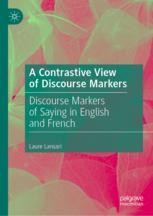A contrastive view of discourse markers: discourse markers of saying in English and French
 This book is a comparative corpus-based study of discourse markers based on verbs of saying in English and French. Based on a wide comparable web corpus, the book investigates how discourse markers work in discourse, and compares their differences of position, scope and collocations both cross-linguistically and within single languages. The author positions this study within the wider epistemological background of the French-speaking ‘enunciative’ tradition and the English-speaking ‘pragmatic’ tradition, and it will be of particular interest to students and scholars of semantics, pragmatics and contrastive linguistics.
This book is a comparative corpus-based study of discourse markers based on verbs of saying in English and French. Based on a wide comparable web corpus, the book investigates how discourse markers work in discourse, and compares their differences of position, scope and collocations both cross-linguistically and within single languages. The author positions this study within the wider epistemological background of the French-speaking ‘enunciative’ tradition and the English-speaking ‘pragmatic’ tradition, and it will be of particular interest to students and scholars of semantics, pragmatics and contrastive linguistics.
zum Buch im ULB-Katalog
zum Buch auf der Verlags-Website
Narrating desire: moral consolation and sentimental fiction in fifteenth-century Spain
 Narrating Desire: Moral Consolation and Sentimental Fiction in Fifteenth-Century Spain proposes a new taxonomy and conceptual frame for the controversial Iberian genre of sentimental fiction. It traces its origin to late-medieval education in rhetoric, philosophy, and medicine as the foundation for virtuous living. In establishing the genre’s boundaries and cultural underpinnings, Narrating Desire emphasizes the crucial link between Eastern and Western Iberian sentimental traditions, and offers close readings of a vast array of Catalan and Castilian fictions, translations, narrative poems, letters, and doctrinal treatises: the Catalan translations of Boethius’s Consolation of Philosophy, Santillana’s El sueño, Bernat Metge’s Lo somni, Romeu Llull’s Lo despropiament d’amor, Pedro Moner’s La noche and L’anima d’Oliver, Rodríguez del Padrón’s Siervo libre de amor, Carrós Pardo de la Casta’s Regoneixença, Roís de Corella’s Parlament and Tragèdia de Caldesa, Pedro de Portugal’s Sátira, Francesc Alegre’s Somni and Raonament, Pere Torroella’s correspondence, and the well-known works by Diego de San Pedro (Arnalte y Lucenda; Cárcel de Amor) and Juan de Flores (Grisel y Mirabella; Grimalte y Gradissa) among others.
Narrating Desire: Moral Consolation and Sentimental Fiction in Fifteenth-Century Spain proposes a new taxonomy and conceptual frame for the controversial Iberian genre of sentimental fiction. It traces its origin to late-medieval education in rhetoric, philosophy, and medicine as the foundation for virtuous living. In establishing the genre’s boundaries and cultural underpinnings, Narrating Desire emphasizes the crucial link between Eastern and Western Iberian sentimental traditions, and offers close readings of a vast array of Catalan and Castilian fictions, translations, narrative poems, letters, and doctrinal treatises: the Catalan translations of Boethius’s Consolation of Philosophy, Santillana’s El sueño, Bernat Metge’s Lo somni, Romeu Llull’s Lo despropiament d’amor, Pedro Moner’s La noche and L’anima d’Oliver, Rodríguez del Padrón’s Siervo libre de amor, Carrós Pardo de la Casta’s Regoneixença, Roís de Corella’s Parlament and Tragèdia de Caldesa, Pedro de Portugal’s Sátira, Francesc Alegre’s Somni and Raonament, Pere Torroella’s correspondence, and the well-known works by Diego de San Pedro (Arnalte y Lucenda; Cárcel de Amor) and Juan de Flores (Grisel y Mirabella; Grimalte y Gradissa) among others.
From them, Miguel-Prendes singles out a group of dream visions whose interpretive and compositional practices sire the sentimental genre. Social interactions lead to either a consolatory or a sentimental form, which imply very different ways of seeing: the allegorical gaze of consolation gives way to narrative fiction. In distorting moral conversion, the sentimental genre heralds the novel.
zum Buch im ULB-Katalog
zum Buch auf der Verlags-Website
Weitere Titel können Sie in unseren Neuerwerbungslisten für die Romanistik entdecken!
